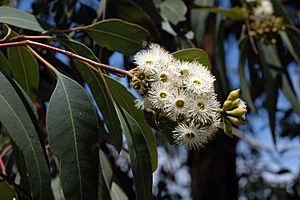Eucalyptus ancophila facts for kids
Quick facts for kids Eucalyptus ancophila |
|
|---|---|
 |
|
| Eucalyptus ancophila in the Waite Arboretum | |
| Scientific classification |
|
| Kingdom: | Plantae |
| Clade: | Tracheophytes |
| Clade: | Angiosperms |
| Clade: | Eudicots |
| Clade: | Rosids |
| Order: | Myrtales |
| Family: | Myrtaceae |
| Genus: | Eucalyptus |
| Species: |
E. ancophila
|
| Binomial name | |
| Eucalyptus ancophila L.A.S.Johnson & K.D.Hill
|
|
| Script error: The function "autoWithCaption" does not exist. | |
Script error: No such module "Check for conflicting parameters".
The Eucalyptus ancophila is a special type of tree that only grows in a small part of New South Wales, Australia. It's known for its tough, grey bark, which looks a bit like iron. This tree also has shiny green leaves shaped like a spear, and its white flowers grow in groups of seven buds. After the flowers, it produces fruit that looks like a cone or a small barrel.
What the Eucalyptus ancophila Looks Like
This Eucalyptus tree can grow very tall, sometimes up to 35 meters (about 115 feet)! It has rough, grey bark that people call "ironbark." On its thinner branches, the bark might be smooth and pale grey.
When the tree is young, or when new shoots grow from a cut stump (called coppice regrowth), its stems have four sides. The young leaves are egg-shaped at first, then become spear-shaped. They are a lighter green on the underside.
Grown-up leaves are spear-shaped, about 9 to 20 centimeters (3.5 to 7.9 inches) long and 1.8 to 4.8 centimeters (0.7 to 1.9 inches) wide. They are only a little bit paler on the bottom.
The tree's flower buds grow in a special way. Each group of seven buds has a small stalk called a peduncle, which is about 3 to 14 millimeters (0.1 to 0.6 inches) long. Each individual flower bud also has a tiny stalk called a pedicel, about 3 to 6 millimeters (0.1 to 0.2 inches) long.
The buds themselves are oval or diamond-shaped, about 6 to 7 millimeters (0.2 to 0.3 inches) long and 3 to 5 millimeters (0.1 to 0.2 inches) wide. They have a beak-like or cone-shaped cap (called an operculum) that covers the flower parts.
Eucalyptus ancophila trees have white flowers, and they usually bloom in November. After flowering, the tree produces fruit that looks like a cone or a barrel. These fruits are about 5 to 8 millimeters (0.2 to 0.3 inches) long and 5 to 7 millimeters (0.2 to 0.3 inches) wide, sitting on a pedicel about 3 to 5 millimeters (0.1 to 0.2 inches) long.
How the Tree Got Its Name
The Eucalyptus ancophila was officially named in 1990 by two botanists, Lawrie Johnson and Ken Hill. They wrote about it in a science journal called Telopea.
The second part of its scientific name, ancophila, comes from two very old Ancient Greek words. Ankos means "mountain glen" or "valley," and philos means "dear one" or "friend." This name was chosen because the tree loves to grow in valleys and along creeks.
Where the Eucalyptus ancophila Lives
You can usually find this special Eucalyptus tree growing near creeks or at the bottom of valleys. It lives in the areas around Kempsey and Bellingen in New South Wales, Australia.
 | Toni Morrison |
 | Barack Obama |
 | Martin Luther King Jr. |
 | Ralph Bunche |

